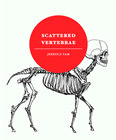reviewed by Ian Chung
When confession equates to excommunication
Like his first collection Chasing Curtained Suns, Jerrold Yam’s second book from Math Paper Press, Scattered Vertebrae, is concerned with the thematic trifecta of desire, family and religion. Both are also prefaced by Biblical epigraphs, the former citing Jeremiah 1:5 (‘Before I formed you in the womb I knew you, before you were born I set you apart…’), and the latter, Ezekiel 37:7 (‘… and as I prophesied, there was a noise, and suddenly a rattling; and the bones came together, bone to bone’). Given that John Wesley’s note on the Ezekiel verse says that ‘in the resurrection of the dead, the scattered atoms shall be arranged in their proper place and order, and every bone come to his bone, by the same wisdom and power by which they were first formed in the womb of her that is with child’, thus connecting the two epigraphs, one might even make the argument that Yam’s collections should be read as two halves of a whole.
This ‘capacity for hurt’ typically centres on the consequences of same-sex desires being made known to the speaker’s family
What sets Scattered Vertebrae apart from its predecessor, however, is how frankly it deals with its subject matter. Whereas Chasing Curtained Suns had poems that took refuge in the third person and were, in Yam’s words, ‘personal in a way that also comments on Singaporean society’, Scattered Vertebrae is composed throughout in the first person and was intended to 'house [Yam’s] most personal and honest poems'. The result is a collection in which the poet’s configurations of desire play out, circumscribed as they are by the twin pressures of family and religion, or in the words of opening poem ‘Cosmos’, the problem of ‘knowledge / before denial’. The same poem candidly begins:
I don’t pretend to know why we are here— why marriage, friendship, love are names we have bestowed on dependence. In each, a capacity for hurt blooms—petals thrust open from desire
This ‘capacity for hurt’ typically centres on the consequences of same-sex desires being made known to the speaker’s family. A poem like ‘Police’ is aptly named, since the potential censure of family members (‘before Grandma returns / I place [the magazines] back’) is what forces the expression of those desires underground into furtive behaviour, so as to provide ‘no cause to make it / any harder to love me’. ‘Foliage’ also agonises over the impossibility of admitting to these desires, ‘I can’t imagine coming out to anyone / under this roof’, as the speaker is placed in a position where ‘leaving and staying / are imperfect solutions’. On the other hand, ‘Monologue’ portrays how when pushed to the brink, there is the temptation to lash out, family ties notwithstanding:
I am because of you, you are half my conspirator, you are half the thief who snatched me from oblivion. I want to use the most shameful part of myself as a weapon, sharpening its hunger for pain, I want to battle for the smallest chance that you will fight to accept me.
The complexity of the confrontation that ‘Monologue’ envisions lies in the speaker’s distressing double bind, since he must confess before he can have a hope of finding absolution and acceptance. However, confession could equally mean excommunication from the family unit, itself a paradoxical state because as the poem points out, the bond of blood is an undeniable fact, regardless of what might be professed. In a poem like ‘Psalm’, desire then comes into conflict with religious belief, revealing the cognitive dissonance that lies behind the reasoning that ‘if I was thoughtfully constructed / according to plan’, then ‘I didn’t have a choice’, yet ‘the biggest and brightest boast of humanity / would never be mine’. In spite of this, ‘Psalm’ offers a measure of solace by its end: ‘Here I am, / pure and unkissed, completely surrendered to / the fearfully and wonderfully made.’
These three strands of desire, family and religion are woven together in the penultimate poem of the collection, ‘Gift’. The speaker opens by conceding:
It could have been much worse: no home to call my own, dysfunctional pieces of a family unhappy with who they are given
The poem then shifts to acknowledging the speaker’s sister as an earthly manifestation of divine grace, of a true example of Christian charity, who accepts a brother that will never be ‘market[able] as the epitome of Christlikeness’. The speaker has ‘waited to be a victim / of the generosity of love’, a curious phrasing that holds notions of persecution and pardon in tension with each other.
Naturally, there is a bitter irony to the speaker’s Christian parents who fail to practise the love that their own gospel preaches. Furthermore, as we have been reminded by Shakespeare’s Portia in The Merchant of Venice, not only does mercy ‘blesseth him that gives, and him that takes’, it is also ‘an attribute to God himself’. It is thus a profound claim to equate the sister in ‘Gift’ to ‘the mercy, the family / I never asked for, but which / has always wished for me to belong.’ It is a moment in the collection that sounds a note of uncomplicated hopefulness. If the speaker’s coming out has allowed brother and sister to truly find each other as family, then perhaps as the closing poem ‘Genesis’ points out, ‘There is joy / in misunderstanding’ after all, both in the sense of having been misunderstood by others and having mistaken the purpose of one’s own existence. To read Scattered Vertebrae is to join with Yam as he wrestles, like Jacob with the angel at Penuel, and to watch this poet overcome.










